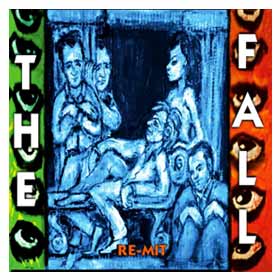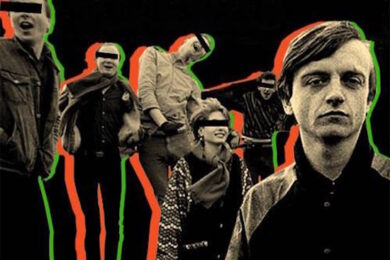The salient quality of nearly all Fall records is the tension between Mark E Smith’s demands of his band and their testing of the boundaries these entail. Perhaps it’s an awareness of this that lies at the root of Smith’s hands-on leadership. The reason that, say, ‘Cruiser’s Creek’ astonishes is that you can hear both the limitations that are being drawn and the individual efforts to chafe away at these: Brix, Steve Hanley, Simon Rogers et al might not have played their parts with the mechanical discipline of session hands, but the track is just as much theirs as it Smith’s, arguably as a precise consequence of the paradoxical way in which insistently-enforced instructions can stimulate antagonistic invention.
Click here to listen or buy on eMusic
Caught live, the present-day line-up is irreproachable. As a rearguard for Smith and Elena Poulou, Dave Spurr, Pete Greenway and Keiron Melling provide the sonic sturdiness needed to replicate the basswards gearshift the albums have made over the last decade. For a while this worked in the studio, too. On the first record featuring the current arrangement, 2008’s triumphant Imperial Wax Solvent, the martial spirit the newcomers brought was not so rigid as to interfere with the unacknowledged responsibility of Fall musicians to fuck about with Smith’s diktats. The cunning and malevolence, the will to disorder, didn’t go away – in fact, it was somehow emphasised by the new-found tightness. Ever since, though, there’s been a creeping sense of there being too much kowtowing to the foreman, as if the arrangement (and this would be a new thing for The Fall) really was mutually convenient in a sustainable way.
Re-Mit is where this comfort starts to look disturbingly like stagnation. One of the first things that jumps out at the listener, and it’s something which persists throughout, is the disconnectedness between Smith and Elena Poulou in the control room, arsing about with daft voices and keyboard squiggles respectively, and the big lads at the back. Spurr, Greenway and Melling have gone from being great fits for the project to simply being very good musicians from the ponytailed-guy-who-works-in-the-guitar-shop school. No matter what they’re playing – and let’s face it, that ‘what’ is largely going to be barrelling Can-rock – there’s a lack of expressive wit, giving the impression that they’re just tossing this off as a demonstration of competent eclecticism before resuming their Steve Vai or Joe Satriani agendas.
What this makes for is a lack of synthesis, which mars nearly every track. After the opener ‘No Respects (Intro)’ (a vocal version of the same song comes later), ‘Sir William Wray’ warms up with an inviting snatch of modal, medievalish keyboard, before crashing into the kind of aggro-glam that characterised the Fall Heads Roll/Real New Fall LP era. After the inexplicable lapses into comedy metal of Ersatz GB, you’re initially pleased that Smith seems to be playing it safe, but it swiftly emerges that his hectoring, barking vocals are underpinned by guitars bearing a gruesome resemblance to ‘Vertigo’ by U2, a group who are surely the anti-Fall. There’s too much professionalism in the ranks – Smith’s autobiographical musings on how being a musician is just another job are laudable redresses to turgid celebrations of the creative genius, but they’ve rebounded on him here.
Repeatedly, it feels as if Re-Mit amounts to little more than Smith and Poulou pasting overdubs onto music that has been rote-learned and then performed unquestioningly. It’s telling that the best song on the record is ‘Victrola Time’, which is actually led – rather than scrawled on – by Poulou’s synth: this is prime 21st-century Fall, which is to say that it sounds like something left over from Imperial Wax Solvent. Also lurking at the tail end is ‘Jetplane’, which stands above most of the material here in terms of coherence and has a pleasingly banks-of-the-Rhine feel. But these successes throw into relief how dismal the majority of the material is: ‘Irish’, with its redundant dig at James Murphy, is lazy and aimless, and ‘Jam Song’ builds from electronic faffing into the sort of glib indie-funk once used to score montage scenes in 90s-era British gangster flicks. The vocal version of ‘No Respects’, meanwhile, sounds like The Inspiral Carpets, and not in the sense of resembling the Smith-enhanced ‘I Want You’.
Oh, and there are skits. ‘Noise’ and ‘Pre-MDMA Years’ can’t really be called songs as such, and seem more like sketches of snide provocation. You buy this kind of attitude when Smith is on form, as with the somehow-not-notorious Harold Shipman-themed ‘What About Us’ on Fall Heads Roll. Not in this case, though: Re-Mit‘s inscrutably bellicose moments just set the teeth on edge, and serve as indicators of the lack of imagination and incisiveness which pervades this album. If music writers are honest, we’d always own up to getting kicks at times from writing bad reviews, but there’s absolutely no joy to be had from laying into an album by the band whose brilliance I’ve spent my whole adult life ranting about. Fingers crossed the decline isn’t terminal.



